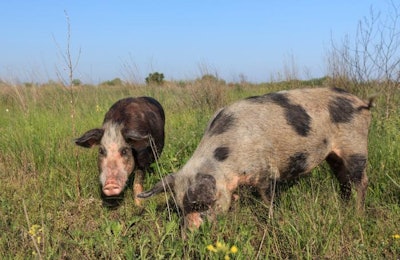
High-end UK grocery retailer, Waitrose, formed an arrangement with the retailers’ dedicated pork supplier to use non-genetically modified (non-GM) soybean pig feed ingredients grown in the Danube river valley of Europe by Danube Soya Producers Association (Donau Soja) members.
Waitrose announced in a press release that the logistical decision is intended to ensure responsible sourcing of non-GM soybean products used by their dedicated pork supplier, Dalehead Foods.
“GM soya from Latin America is linked to rainforest destruction, so sourcing from the Danube Region and using more UK-grown protein crops, are good for the climate, good for UK farmers, and good for consumers,” said Peter Melchett, policy director of the soil association, commenting on the Waitrose announcement.
Movement to find local soy sources
Waitrose and Dalehead aim to join others in reducing Europe’s reliance on imports of soy from South America for animal feeds.
Their first shipment of soy from Donau Soja arrived last month. It had been grown in the Danube region, which covers the river valley area from the Black Forest in Germany to the Black Sea.
“This is fantastic, innovative and determined thinking and the result of three years’ work by our agriculture team,” said Rob Collins, Waitrose managing director, in a press release. “It fits perfectly into our strategy to improve our supply chain security by sourcing animal feed from raw materials grown at home or within the UK and Europe. This is an example of Waitrose working with our supplier groups to deliver a real benefit to our farmers, our global environment, our business and our customers.”
We have recently taken our first delivery of European soya,” said Andrew Saunders, director of agriculture at Dalehead Foods. “A number of Waitrose supply chains have carried out trials on the use of European soya, and we are excited to be the first supply chain to use this source.”
Other sustainability initiatives
According to a press statement, this is just one step made by Waitrose to source raw materials for livestock feeds from nearer to the UK. In its beef, dairy and lamb supply chain, imported soy is being replaced with clovers and other forage proteins, while soy alternatives such as fava beans are being tested as soy replacements for chickens, ducks and pigs.
Donau Soja Association began its program for sustainable, non-GM soybean feed ingredients grown in Europe three years ago. Eggs from hens fed on diet including this material are on sale in Austria, Germany and Serbia.
In June of this year, Waitrose announced it was launching chicken enriched with omega-3 fatty acids, the first UK retailer to market such a product. Produced by its partner, Moy Park in Northern Ireland, the birds are fed diets containing algae, a natural source of omega-3s that help raise the level of these fatty acids in the chiHigh-end UK grocery retailer, Waitrose, formed an arrangement with the retailers’ dedicated pork supplier to use non-genetically modified (non-GM) soybean pig feed ingredients grown in the Danube river valley of Europe by Danube Soya Producers Association (Donau Soja) members.
Waitrose announced in a press release that the logistical decision is intended to ensure responsible sourcing of non-GM soybean products used by their dedicated pork supplier, Dalehead Foods.
“GM soya from Latin America is linked to rainforest destruction, so sourcing from the Danube Region and using more UK-grown protein crops, are good for the climate, good for UK farmers, and good for consumers,” said Peter Melchett, policy director of the soil association, commenting on the Waitrose announcement.
Movement to find local soy sources
Waitrose and Dalehead aim to join others in reducing Europe’s reliance on imports of soy from South America for animal feeds.
Their first shipment of soy from Donau Soja arrived last month. It had been grown in the Danube region, which covers the river valley area from the Black Forest in Germany to the Black Sea.
“This is fantastic, innovative and determined thinking and the result of three years’ work by our agriculture team,” said Rob Collins, Waitrose managing director, in a press release. “It fits perfectly into our strategy to improve our supply chain security by sourcing animal feed from raw materials grown at home or within the UK and Europe. This is an example of Waitrose working with our supplier groups to deliver a real benefit to our farmers, our global environment, our business and our customers.”
“We have recently taken our first delivery of European soya,” said Andrew Saunders, director of agriculture at Dalehead Foods. “A number of Waitrose supply chains have carried out trials on the use of European soya, and we are excited to be the first supply chain to use this source.”
Other sustainability initiatives
According to a press statement, this is just one step made by Waitrose to source raw materials for livestock feeds from nearer to the UK. In its beef, dairy and lamb supply chain, imported soy is being replaced with clovers and other forage proteins, while soy alternatives such as fava beans are being tested as soy replacements for chickens, ducks and pigs.
Donau Soja Association began its program for sustainable, non-GM soybean feed ingredients grown in Europe three years ago. Eggs from hens fed on diet including this material are on sale in Austria, Germany and Serbia.
In June of this year, Waitrose announced it was launching chicken enriched with omega-3 fatty acids, the first UK retailer to market such a product. Produced by its partner, Moy Park in Northern Ireland, the birds are fed diets containing algae, a natural source of omega-3s that help raise the level of these fatty acids in the chicken meat. Omega-3s are polyunsaturated fatty acids that help maintain normal heart, brain and vision function as part of a healthy diet.cken meat. Omega-3s are polyunsaturated fatty acids that help maintain normal heart, brain and vision function as part of a healthy diet.
















